- G7 nations continue to explore possible ways of using $300bn in frozen assets
Harnessing Russia’s frozen assets could provide a ‘game-changing’ $300billion in funding for Ukraine’s war against Russia without costing taxpayers a penny, but a lack of consensus in Europe is stopping it from happening, according to a top financier.
Bill Browder, the CEO and co-founder of Hermitage Capital Management, told Radio 4 this morning that properly utilising $300bn in sovereign assets frozen by the West ‘could be the difference between defeat and victory’ as Ukraine looks to turn the tide with Russia increasingly reliant on its allies for munitions.
‘If Ukraine gets this money it means they can arm themselves properly; they can pay for the weapons they need to defend themselves and fight off the Russians. And as we’re all watching right now, they’ve run out of money… and they’re now starting to lose.’
With $63bn in US aid held up by internal politics, Mr Browder suggests releasing the $300bn in frozen assets would ‘completely change the landscape’ – if the West can reach a consensus on how to use it.
‘If all the major countries do it together… then there’s no adverse consequences for anybody because these are all the reserve currencies in the world… We may have the appetite in the US and the UK… but what we see right now is that there are all kinds of disagreements in Europe.
‘And in Europe it’s not a single decision-making body. There’s 27 countries. And all it takes is one country to say no or maybe or not now and it slows the process. So that’s the big bottleneck in doing it in unison.’
Bill Browder is an American-born English financier and CEO of Hermitage, formerly the largest foreign portfolio investor in Russia. The investment fund and asset management firm specialises in Russian markets.
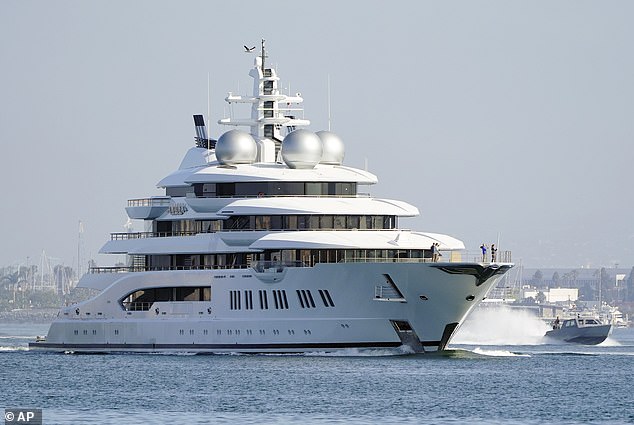
This 348-foot-long, $300 million Amadea mega-yacht was seized from Russian oligarch Suleiman Kerimov in May 2022, costing taxpayers nearly $1 million a month in upkeep
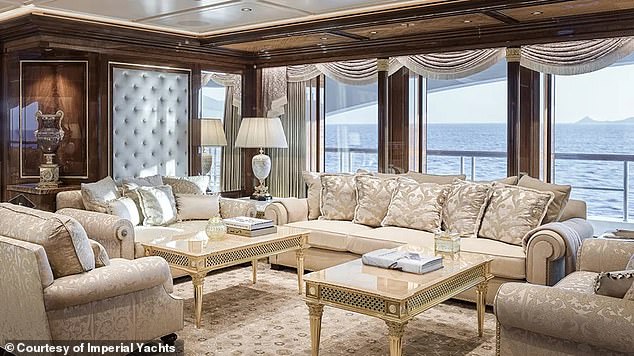
Luxury yacht Amadea, owned by sanctioned Russian oligarch Suleiman Kerimov
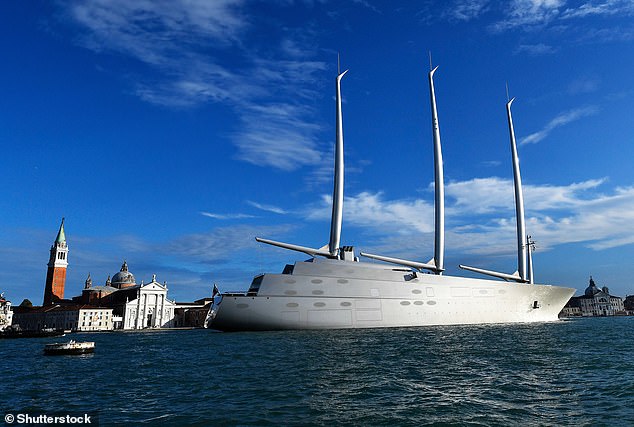
Italian police seized the 470ft Sailing Yacht A, worth £450m, from Russian billionaire Andrey Igorevich Melnichenko in 2022
With the war now in its third year, Mr Browder stressed that while Russia has more resources than Ukraine, a significant cash injection could definitively shift the trajectory of the conflict.
Access to the frozen assets is ‘something that Putin is desperate to avoid because this is effectively a resource war and Russia has more resources’.
READ MORE: Russian attacks on underwater pipelines and cables threaten the security of a billion people across Europe and America, NATO commander warns
However, he says, ‘Putin has burned through his tanks… he’s burned through 450,000 soldiers. They’ve used up all their ammunition and have to get some from the North Koreans and the Iranians.
‘And what Putin is hoping for is that the West gives up, doesn’t fund Ukraine and Ukraine loses. If Ukraine were to get this money then all of a sudden it’s a completely different scenario.’
The obstacle to accessing the funds, Mr Browder warns, lies in internal political disagreement. Were one country to confiscate the assets, he suggests, they could suffer ‘potential negative ramifications’ for the investment climate or currency.
But if the West were able to join in ‘unison’ to harness the assets, ‘then there’s no adverse consequences for anybody’.
Mr Browder suggested there were still ‘all kinds of disagreements in Europe’ blocking the release of the funds.
Speaking in the House of Lords yesterday, David Cameron, the Foreign Secretary, suggested allied powers in the West were close to a breakthrough – echoing similar sentiments voiced last month.
He assured that there was an ’emerging consensus’ between Western countries on how to use the assets, with the US endorsing a plan to borrow billions to send to Ukraine in loans against future interest on the Russian assets.
The idea is supported by the UK – but faces some opposition within Europe. Germany has been more hesitant about the future of the proposed loan.
Jeremy Hunt, the Chancellor, said he would raise the issue with counterpart during his visit to the United States this week.
‘There are a bunch of different legal justifications, of which collective countermeasures is one that could be used,’ Lord Cameron explained to peers last month.
‘But there is also the opportunity to use something such as a syndicated loan or a bond that, in effect, uses the frozen Russian assets as a surety to give that money to the Ukrainians, knowing that you will be able to recoup it when reparations are paid by Russia.
‘That may be a better way in which to do it. We are aiming for the maximum amount of G7 and EU unity on this but, if we cannot get it, we will have to move ahead with allies that want to take this action.’
Mr Browder said the suggestion of issuing bonds on the future value of interest paid on the frozen assets was ‘just overly complicating matters’ and ‘not the right approach’.
Dismissing the legal controversy around the seizure of such assets explicitly for Ukraine, he said: ‘I think it’s a political issue. Should the UK taxpayers be forking out money to Ukraine before Putin forks out the money?
‘And I think the answer is Putin should pay for it before we pay for it.’
In the wake of Putin’s February 2022 invasion of Ukraine, the United States and its allies prohibited transactions with Russia’s central bank and finance ministry, blocking around $300 billion of sovereign Russian assets in the West.
The United States has proposed that working groups from the Group of Seven (G7) major industrialized nations explore ways to seize that money, according to the Financial Times.
Like other central banks, the Russian central bank placed some of its gold and foreign exchange reserves in liquid assets such as major currencies, gold and government bonds. About half of those reserves were held in the West.
The central bank has confirmed that about $300 billion worth of assets have been frozen in the West.
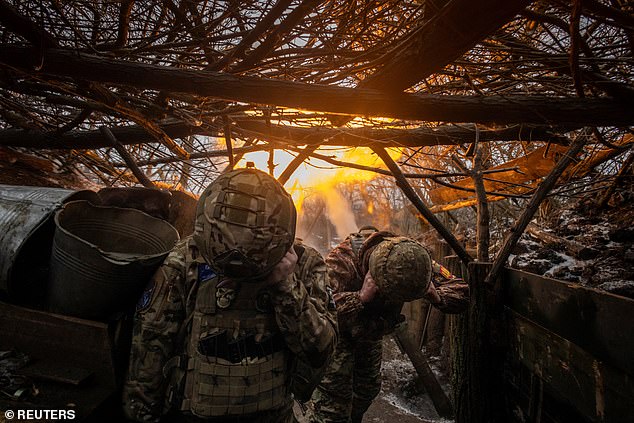
Soldiers fire a mortar at a frontline position in the Donetsk region, January 26. 2024
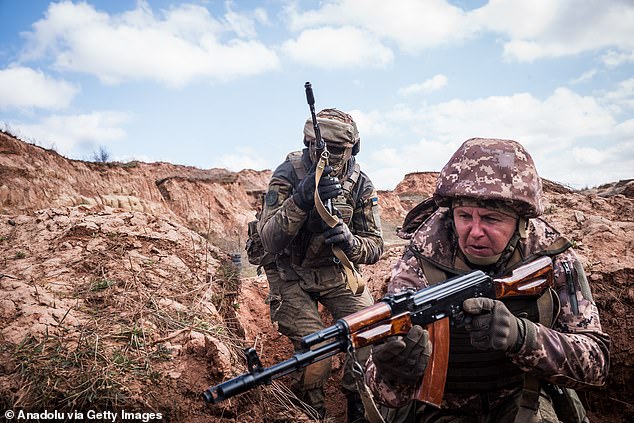
Ukrainian soldiers practice trench operations as the war between Russia and Ukraine continues in Donetsk Oblast, Ukraine on March 24, 2024
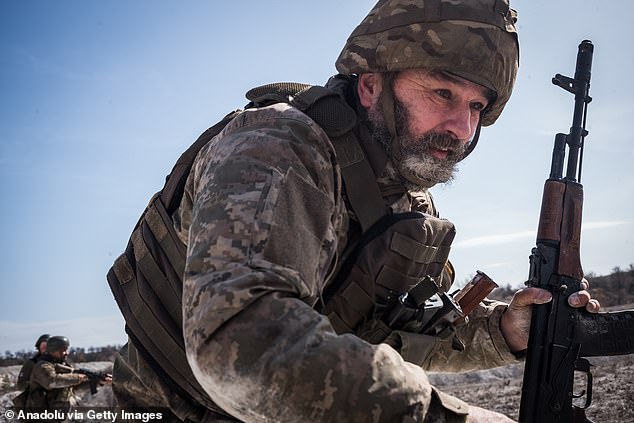
Ukrainian servicemen practice combat exercises in Donetsk Oblast, Ukraine on March 28, 2024
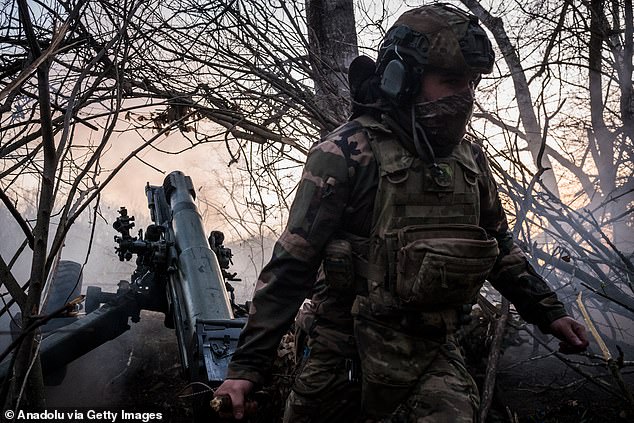
A Ukrainian soldier fires an artillery in the direction of Siversk, Donetsk Oblast, Ukraine on April 1, 2024
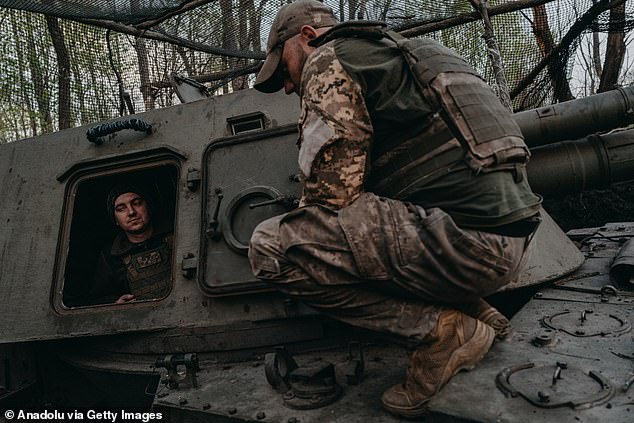
Soldiers from the Ukrainian 57th Brigade are waiting on firing positions as Russia-Ukraine war continues in the direction of Kupiansk, Kharkiv Oblast, Ukraine on April 12, 2024
Total Russian foreign currency and gold reserves totalled $612 billion at the time.
Russia’s central bank said the assets were mainly invested in foreign securities, bank deposits and nostro correspondent accounts.
The banks biggest bond holdings were in the sovereign bonds of China, Germany, France, Britain, Austria and Canada.
Kremlin spokesman Dmitry Peskov told reporters in December that Russia would challenge any confiscation in the courts.
‘If something is confiscated from us, we will look at what we will confiscate,’ Peskov said. ‘We will do this immediately.’
Read more
News Related-
Antoine Dupont still hurt by 'injustice' of World Cup loss to Springboks
-
China's New Aircraft Carrier Begins Catapult Testing
-
Aircraft Downed Inside Russia By Patriot System: Ukrainian Air Force
-
“Am I Prog’s Taylor Swift? That’s a debate that could run and run”: why Peter Hammill re-recorded his Enigma-era albums
-
Car With Pro-Russian Fighters Blown Up by Resistance: Exiled Mayor
-
Europe and African nations must find effective common ground in dealing with migration influx
-
Springbok lock opts not to renew contract with URC team
-
Pravin Gordhan’s deathly legacy: A threat to SA’s economic future
-
Antoine Dupont STILL hurt by ‘injustice’ of Rugby World Cup loss to Springboks
-
Rubber stamping NHI Bill will have damaging consequences for SA for generations
-
Inside horrific conditions Hamas hostages suffered including losing 15lbs in 50 days
-
After the Bell: SA’s NHI healthcare disaster starts right here
-
Gupta-linked development land for sale
-
Gary Neville begrudgingly claims brilliant Man Utd midfielder ‘looked like a Man City player’ in Everton mauling
